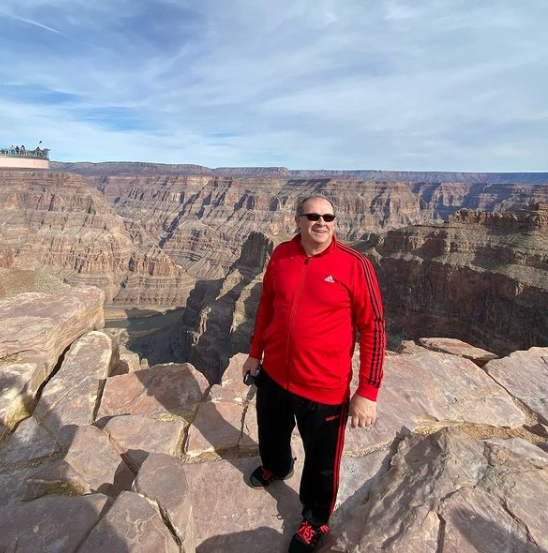My dad passed away on January 7, 2021.
I was in my Chicago apartment, almost 800 miles away from him, when I got the phone call.
A doctor told me that he died in his truck, while on the phone with a work dispatcher. As the doctor spoke, I was positive that it was a scam, a wrong number, the wrong dad. With numb legs, I stumbled to my desk and wrote down the number of the hospital, so sure that it must have been the wrong number.
I believed this so firmly that I never contemplated that my dad actually died because he was good. Good people are protected. They are watched over, and they stick around for walking their daughters down the aisle one day. Good people don’t die, and yet, a good person did.
This story is not about my dad, however.
It’s about me and my journey through grief, and this journey is real, authentic, raw, and radically honest. I have nothing to hide, even if this tragedy is a personal one.
Death is not something we openly talk about in America, and it’s the reason why so many of us who are grieving are looking for ways to quiet our sadness. We do it so that we don’t upset our families and friends who are now the recipients of our sadness when they ask us how we’ve been. We quiet our sadness, and we get busy reconstructing our lives so that we don’t have to sit with our grief. Again, we do it because everyone tells us that life must go on, and so we do.
But I don’t believe that life goes on.
I don’t envision a linear path on which my life unfolds, one that distances me from the grief of losing my dad. I may not know how much of life works, but what I have uncovered is that grief is now a permanent structure in my life. It will grow old with me; it will remind me of its strong presence on my wedding day, and it will find a place to sit between my husband and kids one day.
It will stay, and I can feel this in my bones, so why resist it?
Am I going to spend the best years of my life chasing grief away from my heart? No, and this is why.
My dad was a prayer. He had a way of making you feel so welcomed, even if he just met you on the street.
He lived his life like he was the happiest kid on Earth, and he came from such unhappy circumstances—from poverty and living and fighting through a war-torn country, becoming a refugee, and fleeing to a new land. He was good; he was kind and funny, and he had the most boisterous laugh. Even in the depth of his diseased heart, his laughter was truly his best medicine.
One night, he followed me all the way to my apartment to kill a spider, and I remember looking at him in the rearview mirror from my car, thinking that he’s the kind of dad I didn’t know I needed but was so grateful to have.
These reasons, plus a lifetime of more, are why I won’t chase grief away.
It’s because grief is just love. It’s love for a man who is the reason I am here, being able to shakily write this story and share it with you. It’s love for what that man represented, which was a wild freedom. His passion, fight, courage, and wisdom live in my own bones. I can see their sparks flicker in my own eyes, and I know that I am powerful.
That’s why grief is not an obstacle to push away; rather, it’s an invitation to lean in and love beyond measure. Even if the thought of my dad causes me pain, I know that this pain is actually love. And I can then choose to remember him for all that he was and still is, now in a different form.
There is a tremendous amount of emotions in grief, but as wise men would say, emotion is just energy in motion.
Everything that sits in my heart is just energy waiting to be felt and expressed, which is why I know that my writing will not end. I will not reach a point in my grief journey where I have nothing else to say or feel. Healing is not linear, and there will come times at random when I will remember his jokes or drive by his work, and I will cry. And I will let myself unravel, no longer obsessed with moving on with my life, as if my dad’s passing is something to overcome. Rather, it’s something to remember to let the love back in.
Every part of my body that feels and looks broken by his death is now an opening for love. We don’t have to heal ourselves back to completion; we just need to see that even the broken pieces create art.
If you’ve lost someone, I invite you to lean into this pain, no matter how much you resist. By feeling it, you are honoring their life and the impact they had on you.
Grief is not the enemy of life; it is an ally, showing you how to feel love more deeply in all of its manifestations. Don’t let someone’s death become the breeding ground for your own. Death happens to the living; it happens to those of us who are left behind, to pick up the pieces and celebrate a life well-lived instead of a life too quickly lost.
That is our responsibility: to honor the ones we love through deep, transformative feelings.
People who don’t understand this have not yet felt, and are still in the depths of fear. It’s also not your task to save them from this fear or make them understand your need to be honest about your experiences.
These days, when people ask me how I am dealing with my loss, I share as honestly as I am equipped to handle in that moment. I no longer make it an effort to make others comfortable on the topic of death. Maybe in my honest approach to this topic, I can show others that it’s alright to be authentic in our feelings, and perhaps, this will give them courage to feel that authenticity in themselves, too.







Read 2 comments and reply